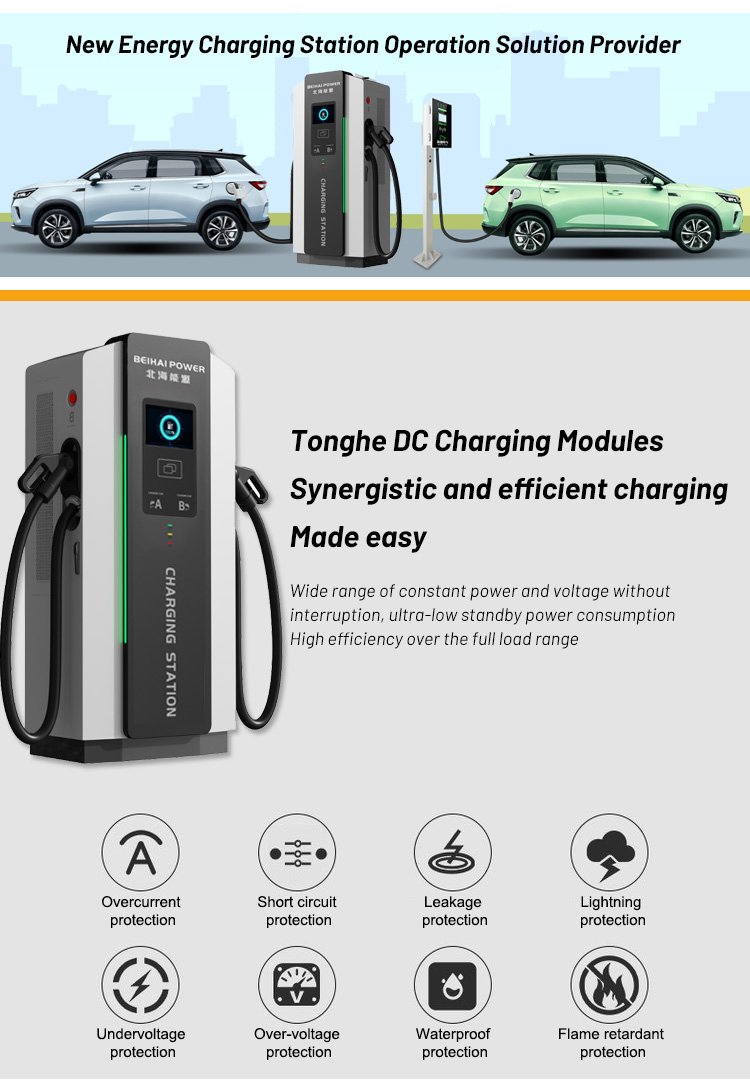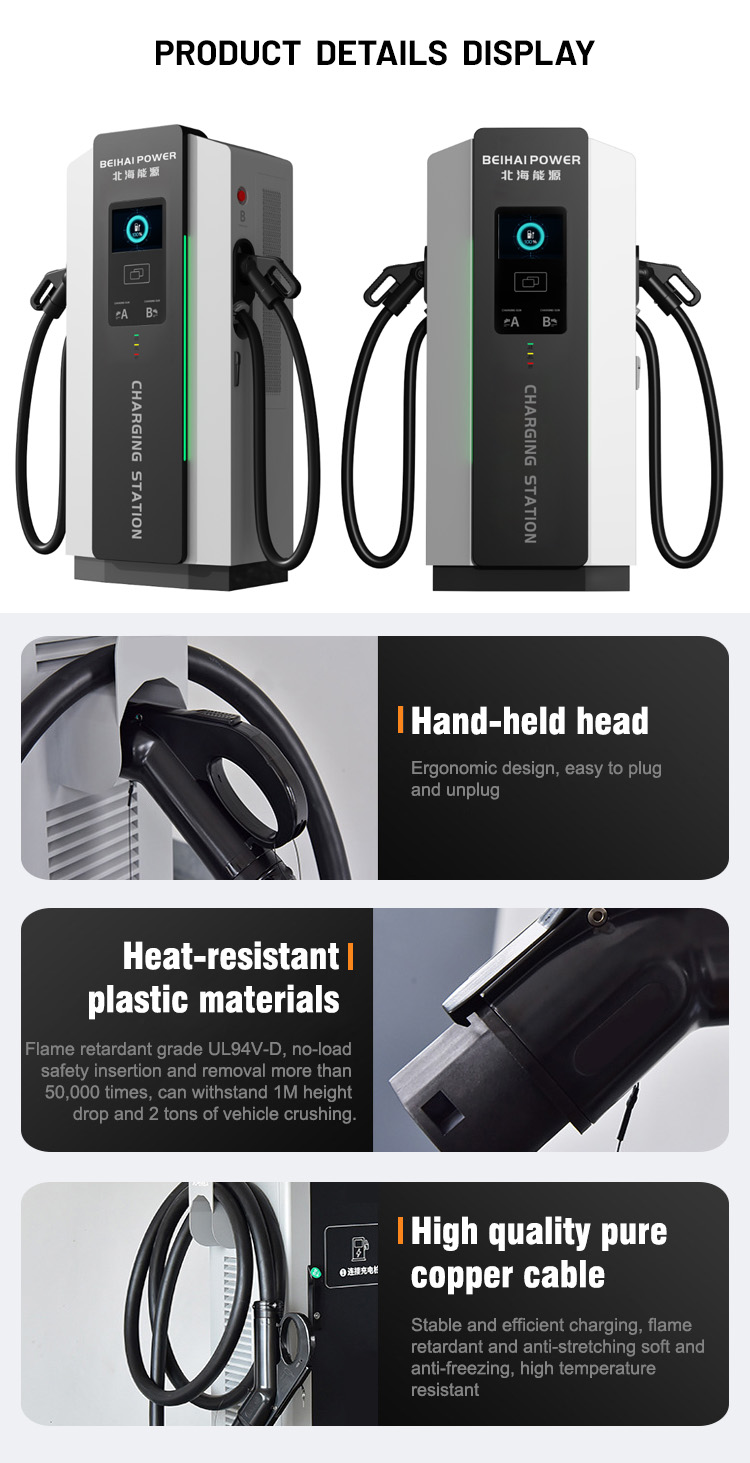80kw DC Electric Car Fast Charging Station EV Charger Manufacturer Supplier Wholesale EV Charging Station
Product Description:
As the demand for electric vehicles (EVs) surges, the significance of direct current (DC) charging infrastructure becomes ever more prominent. DC charging stations, strategically located along highways and in urban centers, are essential for enabling seamless long-distance travel and convenient urban commuting for EV owners.
The mechanism of DC charging is centered around its ability to supply high-power direct current directly to the EV’s battery pack. This is achieved through a rectifier unit within the charging station that converts the alternating current from the power grid into direct current. By doing so, it circumvents the relatively slower onboard charging converter of the vehicle, thereby substantially reducing the charging time. For example, a 200 kW DC charger can replenish around 60% of an EV’s battery in approximately 20 minutes, making it a viable option for quick pit stops during a journey.
DC charging stations come in a variety of power ratings to cater to different needs. Lower-power DC chargers, around 50 kW, are often found in urban areas where vehicles may have more time to charge, such as in public parking lots or at workplaces. They can provide a reasonable charge boost during a typical workday or a short shopping trip. Mid-range power DC chargers, typically between 100 kW and 150 kW, are more suitable for locations where a balance between charging speed and infrastructure cost is required, like in suburban areas or at highway rest stops. High-power DC chargers, reaching up to 350 kW or even higher in some experimental setups, are mainly deployed along major highways to facilitate rapid recharging for long-haul EV travel.
Product Parameters:
| BeiHai DC EV Charger | |||
| Equipment Models | BHDC-80kw | ||
| Technical parameters | |||
| AC input | Voltage range (V) | 380±15% | |
| Frequency range (Hz) | 45~66 | ||
| Input power factor | ≥0.99 | ||
| Fluoro wave (THDI) | ≤5% | ||
| DC output | workpiece ratio | ≥96% | |
| Output Voltage Range (V) | 200~750 | ||
| Output power (KW) | 80KW | ||
| Maximum Output Current (A) | 160A | ||
| Charging interface | |||
| Charging gun length (m) | 5m | ||
| Equipment Other Information | Voice (dB) | <65 | |
| stabilized current precision | <±1% | ||
| stabilized voltage precision | ≤±0.5% | ||
| output current error | ≤±1% | ||
| output voltage error | ≤±0.5% | ||
| current sharing unbalance degree | ≤±5% | ||
| machine display | 7 inch color touch screen | ||
| charging operation | swipe or scan | ||
| metering and billing | DC watt-hour meter | ||
| running indication | Power supply, charging, fault | ||
| communication | Ethernet(Standard Communication Protocol) | ||
| heat dissipation control | air cooling | ||
| the charge power control | intelligent distribution | ||
| Reliability (MTBF) | 50000 | ||
| Size(W*D*H)mm | 990*750*1800 | ||
| installation method | floor type | ||
| work environment | Altitude (m) | ≤2000 | |
| Operating temperature(℃) | -20~50 | ||
| Storage temperature(℃) | -20~70 | ||
| Average relative humidity | 5%-95% | ||
| Optional | 4G wireless communication | Charging gun 8m/10m | |
Product Feature:
DC charging piles are widely used in the field of electric vehicle charging, and their application scenarios include, but are not limited to, the following aspects:
AC Input: DC chargers first input AC power from the grid into a transformer, which adjusts the voltage to suit the needs of the charger’s internal circuitry.
DC Output: The AC power is rectified and converted to DC power, which is usually done by the charging module (rectifier module). To meet high power requirements, several modules can be connected in parallel and equalised via the CAN bus.
Control unit: As the technical core of the charging pile, the control unit is responsible for controlling the charging module’s switching on and off, output voltage and output current, etc., to ensure the safety and efficiency of the charging process.
Metering unit: The metering unit records the power consumption during the charging process, which is essential for billing and energy management.
Charging Interface: The DC charging post connects to the electric vehicle through a standard-compliant charging interface to provide DC power for charging, ensuring compatibility and safety.
Human Machine Interface: Includes a touch screen and display.
Application:
Dc charging piles are widely used in public charging stations, highway service areas, commercial centers and other places, and can provide fast charging services for electric vehicles. With the popularization of electric vehicles and the continuous development of technology, the application range of DC charging piles will gradually expand.
Public transport Charging:DC charging piles play a vital role in public transport, providing fast charging services for city buses, taxis and other operating vehicles.
Public places and commercial areas Charging: Shopping malls, supermarkets, hotels, industrial parks, logistics parks and other public places and commercial areas are also important application areas for DC charging piles.
Residential area Charging:With electric vehicles entering thousands of households, the demand for DC charging piles in residential areas is also increasing
Highway service areas and petrol stations Charging: DC charging piles are installed in highway service areas or petrol stations to provide fast charging services for EV users travelling long distances.
Company Profile
Products categories
-

Phone
-

E-mail
-

Whatsapp
-

Top











